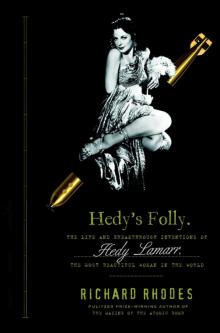- Home
- Richard Rhodes
Woman Who Could Not Forget Page 5
Woman Who Could Not Forget Read online
Page 5
The children attending this class could not watch Saturday-morning cartoons on TV and had to get up early, like they did on school days. They did have lots of complaints. When Iris asked why she had to go to Chinese class on weekends, we told her that knowing one more language was to her advantage in a world that was becoming smaller. We also ensured her if she could master Chinese, at least she could work in the UN as a translator in the future, if there were no other opportunities for her. Already quite precocious, this answer seemed to satisfy her.
We struggled through many years for this Chinese class, until both our children had graduated from elementary school. In teaching Chinese, we decided we should teach children the traditional Chinese characters (as opposed to the simplified ones used by the People’s Republic of China), but decided to use the PRC’s Pinying phonetic system for pronunciation. At the time, teaching traditional Chinese characters and Pinying phonetic together was an innovation. We ignored the political implications by using Pinying. Time tells us we made the right decision, and the teaching method obviously was an advantage for our children. We were also fortunate to have the famous linguistics professor, C. C. Cheng of the University of Illinois, to be their first teacher.
Looking back, we felt the reason that Iris later had no identity problems as a minority in the U.S. may be due to the fact that she had been exposed to Chinese culture in her very early years. She was aware of her roots and was proud to be a Chinese-American.
The house on Broadmoor Drive was really too small for a family of four, although it had that nice big yard. Iris and Michael were big enough now to need their own bedrooms. After we returned from Europe, I spent time trying to find a bigger house for the family. In 1974, Shau-Jin was promoted to full professor in the Department of Physics. It seemed that we were going to stay in Champaign-Urbana for a while, so finding a better place to live was vital.
We bought a new house under construction in southeast Urbana, in a district with an excellent elementary school. After the house was finished, we moved into our new home in April 1974, and Iris attended Yankee Ridge Elementary School in Urbana, near our new house.
While I was busy decorating the new house that summer, Shau-Jin was starting a new vegetable garden in the back yard. Again, we erected a new gym set beside the garden. Because the house was new, we had done all the landscaping ourselves. After we laid the sod down, Shau-Jin and I planted trees and brushes in the front and back yards. Both of us did the digging and planting in the intense, hot summer sun. Doing this gave me some idea of what the lives of the American West settlers had been like, but minus the cattle! It was a period during which we worked very hard to provide a good home for our children and to fulfill our own American dream.
Our house was next to the last lot on the block. The last lot was empty, and beyond the lot was a vast cornfield. Iris was starting to ride her bicycle with training wheels on the sidewalk, exploring her surroundings. Michael stayed busy catching butterflies and other insects with his baseball hat in the empty lot next to our house. The empty lot was full of weeds, including clovers, which attracted many butterflies. For a period of Michael’s childhood, he was obsessed with catching the most beautiful butterflies and moths in that region. He shared his interest with Iris, and we often saw the two of them go on insect hunts: Michael carried a glass jar, and Iris held an insect-catching net. Once they caught a most beautiful and delicate moth, the size of a baby’s palm.
In the summer before the new school year started, we settled into the new house. We bought a new upright Baldwin piano for Iris to learn to play. When I was young, I’d never had a chance to learn any musical instruments. Playing the piano was one of my childhood obsessions. As I mentioned, I was born in Chungking, the war capital of China, in the intensive Sino-Japanese War during the ruthless Japanese invasion. After the war ended in 1945, China fell immediately into a civil war. My parents brought us thousands of miles to escape the war. My memory of my childhood is full of fears, worries, pains, and frights. My parents were constantly planning how to survive, with no time to think about anything more than our basic education. Of course, there was no such luxury as piano lessons. When Shau-Jin and I were finally able to buy a piano in 1974, my childhood dream was transferred onto my own children. I love classical music, and I wished to cultivate my children’s love for it too.
Gradually, we met many Chinese families in our area, and their children were all young and attending Yankee Ridge School. One time I did a count: there were about ten Chinese families living close to our house, and we all became very good friends. All of these families were associated with the University, and they had a similar family background to ours.
During the summer of 1974, on August 29, Shau-Jin and I celebrated our tenth wedding anniversary. We were indeed very content with our new house and our family of four. We had a new community and a new school district. Our lives were starting a new chapter, dynamic and filled with excitement. It was an American dream come true!
In September 1974, Iris started first grade at Yankee Ridge School in Urbana. It is a very emotional moment for a mother to watch her child go off to school on the first day.
Most of the children in our area came from families of the University faculty; thus it seemed that every family emphasized its children’s education. There were high expectations from the parents, and there was competitiveness among the children in the school.
When Iris got home, she always had something to tell me about her day in school. She would often tell me that someone had been teasing or picking on her. Iris was easily hurt, and it took us time to comfort her and to persuade her to think differently. These daily talks helped us establish a very close mother-daughter relationship when she was very young. She surprised me sometimes with how sensitive she was; such sensitivity was absent in other children I encountered. I reminded myself that she was unique and I needed to approach her with extreme patience.
When Thanksgiving arrived in 1974, I was planning to celebrate it as a typical American family would. We had a brand-new house with new furniture, and I wanted the family to feel that it was a home—a home full of love, joy, and thanks. At past Thanksgivings, we had usually been invited by our American friends to go their homes to celebrate; if not, we did not do anything special. But the real reason for our celebration of that year’s Thanksgiving was a report from Iris, our proud first-grader. She said that her classmates in school had asked her whether our family celebrated Thanksgiving.
They said, “Does your mother cook a big turkey or a pumpkin pie?”
She was so ashamed that our family did not.
So I told her: “Oh, yes, we are going to have a big Thanksgiving dinner this year!”
A week before the day, I pulled out our cookbooks and tried to figure out how to cook a turkey. Alas, the bird was really too big even for a family of four; and besides, a whole baked turkey was not my favorite. I convinced Iris that the meat of baked big birds was tough and tasteless, like wooden sawdust. And I told her that there was a recipe I had found in the American Better Homes Cookbook that was easy to cook and was similar to the Chinese style of cooking. The turkey breast was cut into small bite-size pieces, first dipped in melted butter, then rolled in bread crumbs and baked until tender. She seemed to agree with me. I also “baked” a pumpkin pie, a pecan pie, and bread rolls, but of course they were all from frozen sections of grocery stores. Pumpkin pie was Iris’s favorite.
I remember that day being unusually cold. The wind was so strong that we could hear it whistling over the cornfield; but we were all inside, in our warm house, breathing in the butter and cinnamon aroma. Iris and Michael were following me around in the kitchen and waiting for the turkey and the pies. Iris told me incessantly about the stories of Thanksgiving her teacher had just told them in class, such as the stories of American Indians and English pilgrim settlers. She said Thanksgiving dinner should have cranberry sauce, too. But oh, sorry, we forgot cranberries, I said. She said it should have yams
too. Oh, I was so sorry, I did not know that either, I said. How could I forget that lovely scene?! I can still remember the anticipating sparkling eyes of Iris and Michael waiting for their first real American Thanksgiving dinner—complete in spirit even without the cranberry sauce and yams!
When Christmas came, Iris and Michael helped me put up a Christmas tree. We are not Christian, but we were just like anyone else in the country that celebrated the holiday and the New Year with enthusiastic spirit. We bought an artificial plastic Christmas tree, since I had always had an environmental conscience and hated to waste trees for any occasion. Before the Internet era, we always mailed Christmas cards to relatives and friends. I did not forget to remind Iris to mail one to both grandparents. It was a tradition that I helped Iris make a homemade Christmas card to send to Po-Po (my mother) and Gong-Gong (my father) in New York. Iris wanted to write her name in Chinese to show off her skills. She wrote her Chinese name so big, it occupied half the card. My parents were very happy to receive the card, and the result was a big package of Chinese candies and cookies from them. It was a tranquil and blessed family life, indeed!
A Passion Emerges
Beginning in January 1975, Shau-Jin was on leave from the University of Illinois for one semester. He visited the Fermi National Laboratory near Chicago and lived in the onsite housing during the week, and came home on weekends. My parents were waiting to move into a new apartment building under construction called Confucius Plaza, in New York City’s Chinatown. Rather than renewing their lease on their temporary living quarters where they had lived since they arrived from Taiwan, I persuaded them to come live with us while they were waiting for their new apartment. The plan seemed to make sense, so my parents came to stay with us for three months.
From February to May 1975, my parents lived with us, so Iris and Michael gained a strong picture of their grandparents, their lives, and their history. My father was very happy that I had established a children’s Chinese class in the community and that I had taught Iris to read and write Chinese. My father’s pride in being Chinese and his love of Chinese culture and civilization were apparent in every word he spoke to them.
The three months passed very quickly, and when the time came for my parents to return to New York, we had taken many family photos together. The pictures became treasures to me, and I hung them on the wall of our family room for all the years that Iris and Michael were growing up. This visit from my parents in 1975 was the last time they were ever able to travel and to live with us.
Iris grew into a very beautiful girl who always caught people’s eyes when they saw her. Many in the street would tell me how beautiful she was; she was used to hearing that kind of praise. One day, when one of our good-hearted Chinese friends told me again in front of Iris how pretty she was, I secretly pulled my friend aside and told her that she shouldn’t praise Iris to her face so much about her looks. I was worried that too many compliments would make her vain.
In this period, Iris loved to listen to the fairy tales we read to her. In the summer of 1975, when Iris’s first-grade year ended, the whole family drove to Florida’s Disney World. There, Iris was thrilled to see the fairytale princes and princesses in the Magic Kingdom. She looked just like the little Alice in Wonderland when she was sitting in a big carved wooden Dutch shoe, the size of a canoe, wearing a red Swiss folk costume that I had bought for her in Vienna in 1973. She loved the story of Alice’s Adventures in Wonderland; when she grew older, she read Lewis Carroll’s original edition, and loved it like she was a little girl all over again.
In the fall of 1975, Iris started second grade and Michael became a kindergartener. I thought they were old enough for me to go back to work, after three years as a stay-at-home mom. The only problem was that the kindergarten class was only a half day, and I needed to find a sitter to take care of Michael until I got home at 3:00 P.M. I went back to work as a Research Associate in the Department of Biochemistry of the University of Illinois, and worked part-time. Dr. Hager, the professor I had previously worked with, had a new grant for cancer research on the Simian Virus SV40, so I was re-hired by him. My past research experience was on bacterial membranes and I knew nothing about human viruses, but I accepted the job because I was eager to go back to work.
Working and raising young children at the same time was not easy, but I tried to manage it. Needless to say, my life was very hectic. During the week, I was focused on my own research; but on the weekends, my time was totally devoted to the children’s activities such as Iris’s Chinese class, Iris’s group piano lesson, Michael’s group violin lesson, going to the public library, going to the skating rink in the winter, going to the swimming pool in the summer, and so forth, not to mention grocery shopping and driving to and from all the other activities. I was very systematic about scheduling all my time in my Weekly Planner.
On April 5, 1975, President Chiang Kai-shek died in Taiwan. In the 1970s, Taiwan faced a series of setbacks on the international stage. In 1971, the Communist People’s Republic of China was admitted into the United Nations, including “inheriting” China’s seat on the Security Council, and the Republic of China in Taiwan was kicked out of the United Nations, since the UN recognized only one China. In March 1973, the U.S. withdrew its troops from South Vietnam. In April 1975, Saigon fell quickly to the Viet Cong. After President Chiang died, people in Taiwan were uncertain about the future of Taiwan. Shau-Jin’s parents were also thinking of emigrating to the U.S. since all their children were now here.
In June 1976, Shau-Jin’s parents came to the U.S. for a visit. It had been several years since they last visited us, not since Iris was only one year old. Now Iris was eight. Iris and Michael were very excited to see their paternal grandpa and grandma, Ye-Ye and Nai-Nai, respectively, as they were called in Chinese. Although Nai-Nai did not understand English and spoke a Jiangsu dialect, which was hard for both children to understand, you could see that both grandpa and grandma loved their grandchildren dearly, without any reservations.
In the several weeks Ye-Ye and Nai-Nai were with us, we took the opportunity to bring them and the children to visit Lincoln’s tomb near Springfield. We were eager to use the trip as an educational tool for our second-grader, who was enthusiastic about learning more about the American presidents, especially President Lincoln. Shau-Jin and I had applied for U. S. citizenship almost six years previously; finally, in the summer of 1975, it was granted to us. We were sworn in as naturalized U. S. citizens in Danville, Illinois on October 15. We told Iris and Michael that we now had the right to vote, but, as naturalized U.S. citizens, we could not be elected president of the U. S.; but they could become president, because they had been born in the U. S. and were therefore American citizens by birth.
Nineteen seventy-six was the two hundredth anniversary of American independence. When July 4 arrived, Iris was thrilled when the whole family, plus Ye-Ye and Nai-Nai, went to downtown Urbana to watch the July 4 parade. She was always the one in the family who was most excited about these things. Iris’s eyes were sparkling with tremendous excitement when the parade procession passed in front of us! That evening, the whole family went to the University of Illinois football stadium to watch the spectacular firework display.
When we brought Shau-Jin’s parents to visit his older brother Shau-Yen in New York, I took the opportunity to bring our children to visit my parents in New York’s Chinatown. At this time, my parents had moved to the newly built high-rise apartment building there, at Confucius Plaza. It was a new experience for Iris and Michael. The streets of Chinatown were lined with interesting shops: Chinese grocery stores, Chinese restaurants, Chinese herb and tea shops, antique stores, and much more. Iris and Michael were impressed by the Chinese words displayed on the windows and storefront. The street was very crowded, filled with all sorts of races coming from different parts of the world. The crowd and the high noise levels were in high contrast to the quiet of Urbana.
When Shau-Jin went to Taiwan in 1976, he brought a numb
er of Chinese children’s books back with him. There were books on Chinese literature for children, and some on famous ancient Chinese legends. Because Iris was fond of the Western fairy tales, we wanted to show her that there were Chinese folktales too. We had told her many ancient Chinese folktales at the dinner table, such as the stories from The Adventure of Supermonkey, the story of Mu Lan, and the stories from The Three Kingdoms.
When the Chinese Mid-Autumn Festival came in September, we bought moon cakes for the celebration. The Mid-Autumn Festival is one of the three most important Chinese holidays in the year, and it is on the fifteenth day of the eighth lunar month, according to the lunar calendar. When I was little, my parents and our whole family usually sat outside the house on the patio and ate moon cakes while we enjoyed the beautiful bright full moon. It’s a festival that originated in ancient China, to celebrate the abundance of food after the harvest, when the moon is at its fullest. We did the same thing that night. We sat on the patio and looked at the moon, and we told Iris and Michael the story of the beautiful lady Chang’e Wo who ascended to the moon after she drank the elixir of life, according to the legend. And we also told them the legend about how on the anniversary of Chang’e Wo’s ascension, there was an uprising of Han Chinese against the Mongol rulers of the Yuan Dynasty in the fourteenth century. Although the legend might not be entirely historically accurate, we told them the tale nevertheless. Iris was fascinated by all the Chinese stories we told her. To her, China was far away, mysterious, and enchanted. She was quite aware that her ancestors had come from that mystical ancient country.
The Chinese New Year fell on February 18 in 1977. It could occur either in January or February in different years according to the lunar calendar. Po-Po and Gong-Gong in New York, as well as Ye-Ye and Nai-Nai in Los Angeles, mailed a big parcel of goodies to Iris and Michael. In addition, they also asked us to give each of their grandchildren a red envelope on behalf of them—an old tradition on Chinese New Year’s Eve. In the envelope we put money, and we gave it to the children on New Year’s Eve as a gift, a welcome symbol for starting a prosperous New Year. Needless to say, Iris and Michael welcomed all the gifts; they were the beneficiaries of both cultures. They were glad to celebrate both Chinese and Western holidays!

 The Twilight of the Bombs
The Twilight of the Bombs Hedy's Folly
Hedy's Folly Making of the Atomic Bomb
Making of the Atomic Bomb Woman Who Could Not Forget
Woman Who Could Not Forget